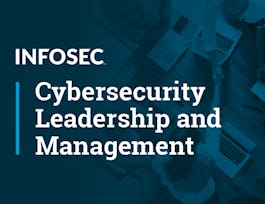This course offers a thorough exploration of IT governance principles and their application in information systems auditing. You will begin with the foundational aspects of governance, including the policies, controls, and best practices that support effective enterprise IT management. Understanding the role of business intelligence, strategic planning, and organizational structures will be crucial for those looking to align IT initiatives with broader business goals. Detailed discussions on IT standards, policies, and procedures will provide the clarity needed to differentiate and implement these essential governance components effectively.



Governance and Management of IT
This course is part of CISA: Certified Information Systems Auditor Specialization

Instructor: Packt - Course Instructors
Sponsored by EdgePoint Software
Recommended experience
What you'll learn
Understand IT governance concepts and their impact on business strategy
Analyze and apply risk management frameworks and maturity models in audit processes
Evaluate and implement IT policies, procedures, and compliance standards
Manage organizational change and allocate resources effectively in IT governance
Details to know

Add to your LinkedIn profile
3 assignments
October 2024
See how employees at top companies are mastering in-demand skills

Build your subject-matter expertise
- Learn new concepts from industry experts
- Gain a foundational understanding of a subject or tool
- Develop job-relevant skills with hands-on projects
- Earn a shareable career certificate


Earn a career certificate
Add this credential to your LinkedIn profile, resume, or CV
Share it on social media and in your performance review

There are 4 modules in this course
In this module, we will explore the fundamentals of IT governance, including its definition and importance. You will learn best practices for implementing IT governance within an organization, understand the role of business intelligence in strategic planning, and distinguish between IT standards, policies, and procedures. Additionally, we will cover the organizational structures that support effective IT governance.
What's included
5 videos2 readings
In this module, we will focus on the roles and responsibilities critical to IS governance, emphasizing the importance of segregation of duties. You’ll gain insights into risk management processes and learn how to conduct both qualitative and quantitative risk analyses. We will also introduce maturity models such as ISACA’s Capability Maturity Model Integration to assess and improve control and policy effectiveness.
What's included
4 videos1 assignment
In this module, we will discuss the management of IT and human resources within an organization, focusing on compliance with industry standards and regulations. You’ll explore resource utilization and IT portfolio management, as well as human resource practices like recruitment and training. Additionally, we will address the impact of organizational change management and financial considerations in the context of IS audits.
What's included
5 videos
In this module, we will delve into cloud governance and the complexities of managing third-party services. You’ll learn about the governance of cloud environments, legal and regulatory considerations, and the importance of maintaining business continuity. We will also cover quality assurance practices, performance metrics, and reporting frameworks, such as COBIT and ITIL, to enhance the quality and effectiveness of IT audits.
What's included
4 videos1 reading2 assignments
Instructor

Offered by
Why people choose Coursera for their career




Recommended if you're interested in Computer Science

University of Illinois Urbana-Champaign

Macquarie University

Infosec

Open new doors with Coursera Plus
Unlimited access to 10,000+ world-class courses, hands-on projects, and job-ready certificate programs - all included in your subscription
Advance your career with an online degree
Earn a degree from world-class universities - 100% online
Join over 3,400 global companies that choose Coursera for Business
Upskill your employees to excel in the digital economy



